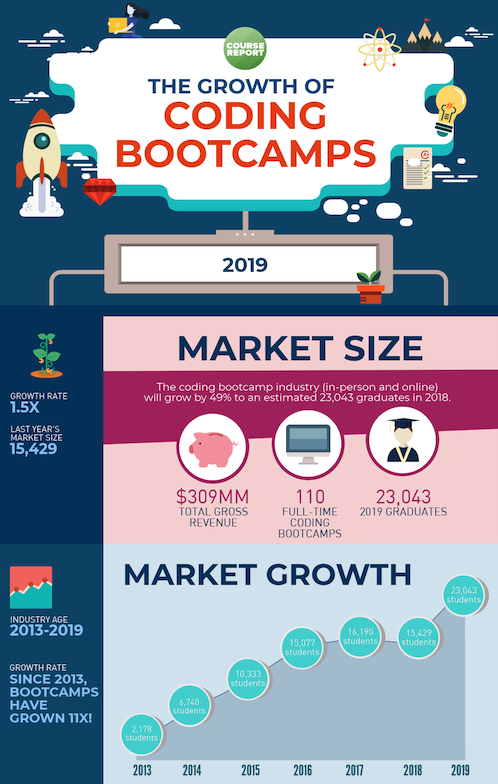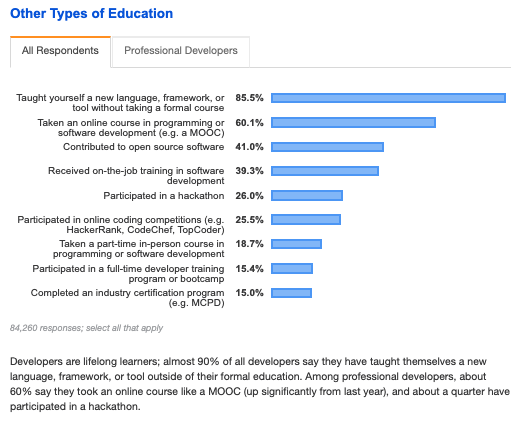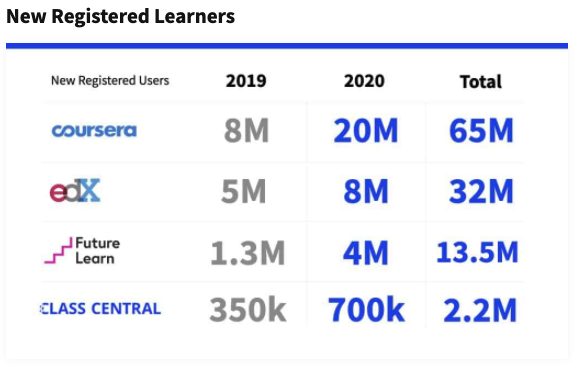The state of coding bootcamps in 2020
My role at Pipeline Academy entails a variety of things I really love to do, one of them is setting up a strategy for the company and translating it into actionable operational steps.
It's pretty much like using any map:
Understanding the industry/market that my company is active in by analysing where we came from and where we are right now.
Define a desirable future state or an idea of the value you generate (use your preferred framework).
After that comes the fun part, finding the path that gets us there.
So here is my step #1, let's see how the world of coding bootcamps looks like from different perspectives (industry analyst, bootcamp organiser, participant) based on some of the key resources I've encountered during my never-ending voyage on the internet. If you'd like to get closer to understanding this fairly new educational format and you are looking for a non-comprehensive starting point, you might find the links below useful.
Field guide
One of the most important write-ups about coding bootcamps has been done by Quincy Larson, the teacher who founded freeCodeCamp.org: this very no-nonsense document called The Coding Bootcamp Handbook is a reality check and golden piece of advice for anyone who just recently fell in love with the idea of going to a bootcamp and magically upgrade their lives 'get-rich-quick-scheme'-style. The sobering reality is:
“Going to a bootcamp can be the best decision you ever made. Or it can be an awkward financial setback. Do your research. Save up your money. Learn coding fundamentals first. Bootcamps aren't magic. They aren't going to do the work for you. In the end, the experience is what you make of it. So make the most of it.”
The DOs and DON'Ts of this universe have been shared in a four-part story by Marco Morawec, Co-Founder of the Firehose Project that has meanwhile been acquired by Trilogy education (that has meanwhile been acquired by 2U Inc.). It presents solid evidence-based guidance for the makers of bootcamps and for aspiring participants as well, and makes you cut the bullshit and focus on what brings you forward:
“Quality and depth of the curriculum
Emphasis on the coding fundamentals – algorithms and data structures
A bootcamp team that is technical and 100% focused on student outcomes, not marketing metrics
Everything else a coding bootcamp focuses on is useless”
Here is the rub: whether you are planning to organise a coding bootcamp or you are considering participating in one, make sure you keep it real. While there are way too many buzzwords and promises floating around, what you put in is what you'll get out of it.
The coding bootcamp market
Most of the public information about the state of the market is based on data from the US and Canada. While the formal education system in Europe is different in many aspects, and it seems like there is very little structured and comparative data available on the current size and quality of the industry, the European countries face similar challenges in filling the competence-gap on the highly competitive and fast-paced job market. Therefore, any implications and assumptions need to be treated with caution.
The media loves to reference the latest market analysis by CourseReport.com, since this coding bootcamp review platform offers its readers the most basic, and at the same time the most crucial key performance indicators in a simple format. In the comprehensive Coding Bootcamps in 2020: Your Complete Guide To The World of Bootcamps report you get access to a lot of details about their research and the most important findings, that they've summarised like this (note: the data is self-reported by the participating schools):
“Coding bootcamps are intensive, accelerated learning programs that teach beginners digital skills like Full-Stack Web Development, Data Science, Digital Marketing, UX/UI Design, Cybersecurity, and Technical Sales.
The average bootcamp costs ~$13,500, and graduates report an average starting salary of $67,000. Bootcamps can vary in length from 6 to 28 weeks, although the average bootcamp is ~14 weeks long.
Coding bootcamps teach modern, widely used programming languages and frameworks like Ruby on Rails, Python on Django, JavaScript, and PHP stacks through project-based learning. Students graduate from bootcamps with a portfolio, an online presence, interview skills and more. Most bootcamps help graduates find an internship or match students with an employer network – in fact, in Course Report's most recent research, 83% of bootcamp alumni report being employed in programming jobs.
There are bootcamp campuses in over 85 cities throughout the US/Canada. Coding bootcamps are predicted to graduate 23,000 students and gross $309MM in tuition revenue in 2019.
The average bootcamper has 6 years of work experience, has at least a Bachelor's degree, and has never worked as a programmer. However, the number of students with degrees appears to be declining slightly over time.
A lot has changed since bootcamps launched in 2012: University Bootcamps are now competing with household bootcamp names, payment options like Income Share Agreements and Deferred Tuition have exploded in recent years, and many bootcamps are dipping into the corporate training market.”
CourseReport started releasing its Coding Bootcamp Market Size Study in 2017, and since then they have done it in 2018 and 2019 as well. In addition, a separate Coding Bootcamp Alumni Outcomes & Demographics Report has been issued 2018 and 2019 to share more transparency for (potential) students and manage expectations towards promised outcomes.

An even more academic approach can be found in the RTI Press publication Alternative and Independent: The Universe of Technology Related "Bootcamps" by Caren A. Arbeit, Alexander Bentz, Emily Forrest Cataldi and Herschel Sanders. This 2017 report does a great job in highlighting the reasons behind the critique that feels almost like an overused cliche in 2020:
“While the bootcamp model holds a great deal of promise, it is currently an unregulated, unaccredited sector of higher education with little transparency and no independent outcomes data.”
My favourite and most comprehensive market research has been released on CareerKarma: written by James Gallagher, the State of the Bootcamp Market Report 2020 is a highly professional and extensive analysis. It is an attempt to cover all the aspects that belong in a proper market exploration while trying to redefine some of the standards of measuring the dynamics of this specific market (note: CIRR is one attempt to move towards a clear standard in reporting outcomes). He ends up with a significantly higher gross total market revenue for 2019 than CourseReport, which shows how intransparent the US market is - not to mention the rest of the world. In addition, the report includes a map of the ISA landscape, which will be subject to consolidation in the upcoming years similarly to the bootcamp business.
“If bootcamps continue to innovate and find success equipping people with tech industry-ready skills, the bootcamp sector will likely see significant growth over the next five years — both in the number of bootcamps and the number of students enrolling in them. There also may be a period of consolidation in the space, as existing players become more dominant and look to expand their influence. In addition, the growth of coding bootcamps and the increased diversity in their offerings suggests that the bootcamp model could have wider applications than solely within the context of programming instruction. As courses in digital marketing, technology sales, and other non-coding technical disciplines have become more common, it may be a signal that bootcamps are looking to expand outside of programming disciplines. This would allow the bootcamp model to be applied to a much larger market segment: post-secondary training in non-technical fields. Overall, bootcamps have proven themselves an effective pathway to a career in tech for thousands of people, and all signs indicate that the sector will continue to grow in coming years.”
Jay Wengrow, the CEO of a coding bootcamp called Actualize summarizes the state of the industry (as of 2018) based on his insightful experiences building up his company focusing on the challenges of the past years and the ones to come in the near future.
Organic growth is clearly visible, however not at the pace of software startups. Every time you encounter new data about the market or participants, you have to double-check the source and be cautious when basing decisions on them.
Business model and scaling
The latest analysis called Bootcamps and ISAs: Economics, Challenges, and Opportunities by Christoph Rindlisbacher looks at the coding bootcamp concept and business model from the perspective of a financial investor and comes to a conclusion that won't please VCs, but it ultimately shows a positive outcome, highlighting that the last decade was fairly turbulent:
“The structural obstacles to scaling a bootcamp identified by this report will make it difficult for any bootcamp to achieve venture scale returns. This does not mean that short-term education is not a worthwhile endeavor or a viable business idea. Affordable alternatives to four year degrees are good and needed, and it’s theoretically possible for bootcamps to turn a profit while providing high quality education. However, all the available information suggests it’s difficult for bootcamps to be both profitable and to provide high quality education while growing at a rapid pace. It’s difficult to imagine a scenario where a coding bootcamp is a good venture capital investment.”
One approach for scaling exercised by a lot of coding bootcamps is focusing on diversity and promoting (and often subsidising) female and minority participation in order to boost their ratio in the tech workforce. The events unfolding in 2020 have accelerated this notion radically.
According to StackOverflow's Developer Survey Results 2019, about 15.4% of all respondents have participated in a full-time developer program or training bootcamp. It should be noted, that bootcamps are not necessarily meant to be starting points for careers in tech, they represent an opportunity for reskilling and moving away from commoditised coding languages or unpopular fields.

Y Combinator intends to play a significant part in the future of non-traditional education, and has put their money where their mouth is attempting several promising tweaks to the business model... without any major success yet though. It seems like even their bootcamp called Modern Labor tried experimenting with connecting their educational business model with private sector projects through an ISA, but they had to realise that scaling education while keeping up the quality might be a more difficult task than anticipated. This leads us to our next point.
Seeing Silicon Valley's tendency to abuse their users in exchange for rapid company growth and in order to please their shareholders, the limits of scalability are both a challenge for coding bootcamp organisers and a helpful indicator for people searching for the right school. Reinventing the wheel did not work out for any school yet, but this does not mean that it won't in the future - you just need to make sure you are clear about the risks involved.
2020
I am not sure how this year is going to go down in history, but I am confident that we all will have some anecdotes to tell about it. Observing how the lockdown, the social distancing measures, the pandemic-caused rise in unemployment and the WFH trend are accelerating the overdue seismic shift in higher education, the way we approach education as a means of personal socioeconomic improvement changes significantly.
Sidenote: the popularity of MOOCs shot through the roof during lockdown, but a certain level of sobering is already visible on the horizon as most learners have realised that they are just not motivated and/or disciplined enough to complete the courses they've signed up for - the 2021 numbers will tell the full story.

Critique and scandals
There are several solid articles for everyone looking for some research-backed advice on the upsides and downsides of attending a bootcamp, and various much more personal pieces from former students who suffered serious physical and mental stress during attending an intense school.
While there were several small-to-medium scale scandals and closures around coding bootcamps in the last couple of years, they usually repeat the same mantra:
The bootcamp graduates are not fit to become software engineers at the highest-profile tech companies like Google,
Coding bootcamps use misleading marketing claims and post false outcome stats in terms of placement and salaries,
The quality of education participants receive is subpar and not worth the tuition fee (combine this with critique about ISAs as a financial instrument),
The bootcamps are intense and stressful, some are ill-equipped to keep up with the fast pace.
Now, there are real life examples to all of the above claims (and usually they come in a bundle), but it shall be noted that the same critique applies to for-profit higher ed in general. Universities and colleges (while partially being regulated) don't receive scrutiny for unfulfilled outcomes, but the related financial debt has become one of the key economical issues of todays generation in the US, and therefore a highly politicized topic.
One additional theme that comes back in a cyclical manner is related to VC investment in larger bootcamps that cannot deliver on their inflated market valuations. The latest large scandal being about Y Combinator backed Lambda school, and its founder Austen Allred. An other sizeable scandal that made it into mainstream media was a sexual misconduct story at DataCamp.
The unquestionable gap in the education market filled by bootcamps and its importance in the future has been noticed by Washington as well, and we'll be witnessing even more political involvement in the coming years mostly focusing on regulation of financing and quality control - or even tying the two together by connecting institutional compensation with positive outcomes.
Future outlook
The socioeconomic trends driven by digitalisation outside of Silicon Valley and the "traditional" tech sector will result in an even higher demand for skilled tech workers. This is going to drive more experimentation, but also more consolidation to the (coding) bootcamp market. Business models combining online and offline learning, individual and corporate training and various forms of financing opportunities will to come and go. And politics is going to get involved with the notion to ensure outcomes for participants, regulation and comparisons with formal educations are already on the horizon.
Differentiation and expansion into new non-tech areas should be expected, just as vertical expansion of the value chain turning educational institutions into end-to-end players on the tech (labour) market.
The future of the bootcamp business will be shaped by the general progress in edtech, and the growing, unsustainable socioeconomic bubble of US higher education, where multiple analysts expect major disruption in the upcoming decade. The likely new entrants to the educational sector are Apple, Google, Microsoft and Amazon: all of them have access to the capital and the tech competence to get involved in higher ed in a big way. Offering edtech tools and training, hardware to equip classrooms or enable learning from home, digital learning platforms combined with subscription models that end with a certification… you name it. Partnering with ivy league institutions who have raised their margins in an unprecedented manner in the last five decades will enable a more accessible college experience which however will be trimmed to deliver stakeholder value, not one that is aimed at serving society across the board. As for coding bootcamps, most of them don’t have the brand recognition that would justify an investment from the largest players, but the opportunity to partner up with medium-sized or local tech players is still huge.
Before we close this chapter, let's reflect on what the key learnings of the last decade really are. Here is some more operative advice for coding bootcamps by Jonathan Lau, the founder of SwitchUp.org, one of the two leading review site for coding bootcamps:
“DON’T SCALE UP AT THE COST OF QUALITY
REFLECT THE NEEDS OF LOCAL MARKETS
KEEP YOUR OFFERINGS CURRENT AND RELEVANT
COMPETE ON CREDIBILITY ABOVE ALL ELSE
EMBRACE FEEDBACK FROM THE MARKETPLACE”
Similarly, Jason Moss (President and Founder of the data science bootcamp Metis) has provided his POV on the last years working on turning his school to a success story:
“Embrace continuous transformation. Nothing is “right” for long.
Think digital first. Plan for scale from the get-go.
Fish in large ponds.
Don’t make assumptions lightly. Be clear about big decisions.
There is excellence in focus.
Invest in people and reputation. Good things will follow.”
Closer
To finish off, allow me go back to The Coding Bootcamp Handbook for a minute and point out a few words that are on my mind since the decision about founding Pipeline Academy, the first school for data engineering has been made:
“[...] new coding bootcamps have something to prove. Their teachers and staff will work like crazy to ensure the school succeeds. They'll try their hardest to train you. They'll help you get a good job so they can get a win under their belt and onto their testimonials page.”
Whatever the future vision will look like (and trust me, I already have a not-so-vague idea about it), this will be the guiding light when starting the journey. And this is what you should expect from us. Nothing less.